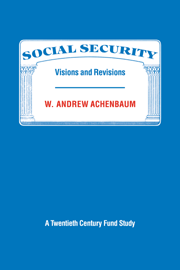Book contents
- Frontmatter
- Contents
- Dedication
- Foreword
- Acknowledgments
- Introduction
- Part I Social security comes of age
- Part II Current social security issues in historical perspective
- 5 Retirement under social security
- 6 Social security and the modern American woman
- 7 Universal coverage: an either/or proposition?
- 8 Federal health care programs and social security
- 9 A vision renewed: individual needs and mutual responsibility
- Notes
- Index
9 - A vision renewed: individual needs and mutual responsibility
Published online by Cambridge University Press: 04 August 2010
- Frontmatter
- Contents
- Dedication
- Foreword
- Acknowledgments
- Introduction
- Part I Social security comes of age
- Part II Current social security issues in historical perspective
- 5 Retirement under social security
- 6 Social security and the modern American woman
- 7 Universal coverage: an either/or proposition?
- 8 Federal health care programs and social security
- 9 A vision renewed: individual needs and mutual responsibility
- Notes
- Index
Summary
Constructive debate over the fundamental issues besetting social security is essential for the nation's political and social, as well as economic, well-being. OASDHI began, after all, as a vision of individual needs and mutual interdependence that would change and grow in response to America's own evolution. FDR knew that he was only laying the cornerstone for a new federal venture intended to harmonize individual need with mutual responsibility. He thought that by requiring workers to contribute to his program, “no damn politician” could scrap it. He did not foresee that a new generation would come of age, largely ignorant of or oblivious to the fruitful inspiration that gave birth to social security.
In the past, it really did not matter that politicians and the public did not understand how OASDHI operated. Social security was a good deal and seemed to work – and that was all that counted. The system proved resourceful in adapting itself, by piecemeal reform and incremental policymaking, to the challenges posed by its first half century. Lawmakers largely managed to avoid making tough choices that would cost them votes. Using euphemisms and technical jargon became part of the policymaking process, not because social security's architects wanted to mislead the public but because the experts (many of whom had dedicated their careers to the cause) presumed that this was the best way to sustain growth and bolster confidence.
- Type
- Chapter
- Information
- Social SecurityVisions and Revisions: A Twentieth Century Fund Study, pp. 179 - 196Publisher: Cambridge University PressPrint publication year: 1986



